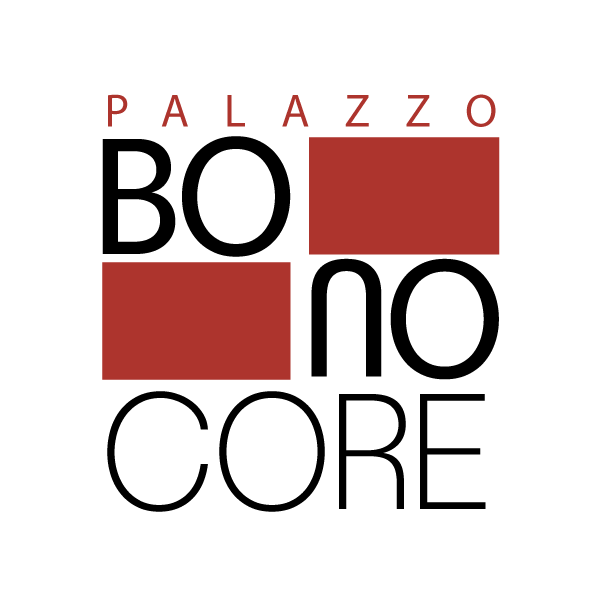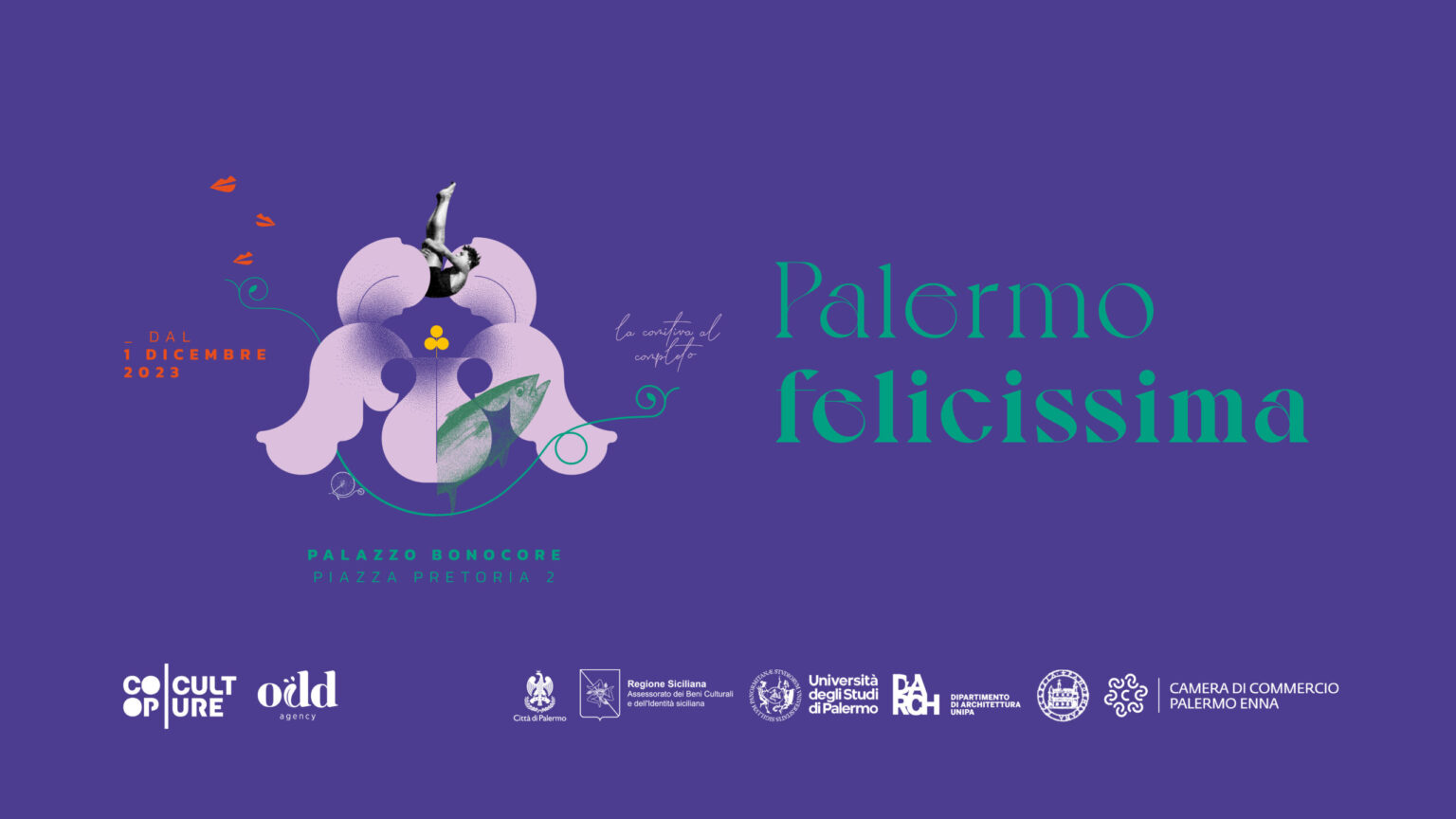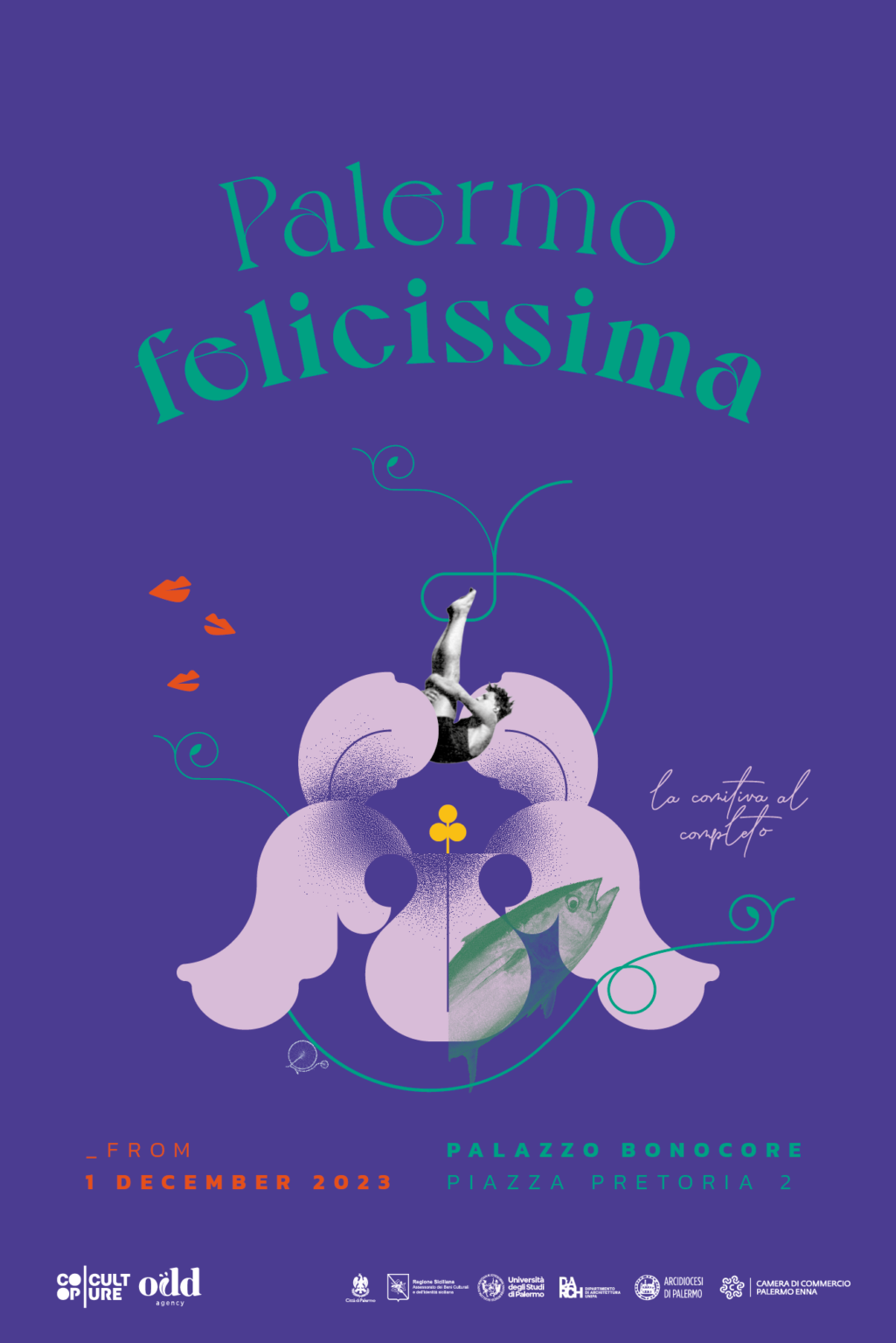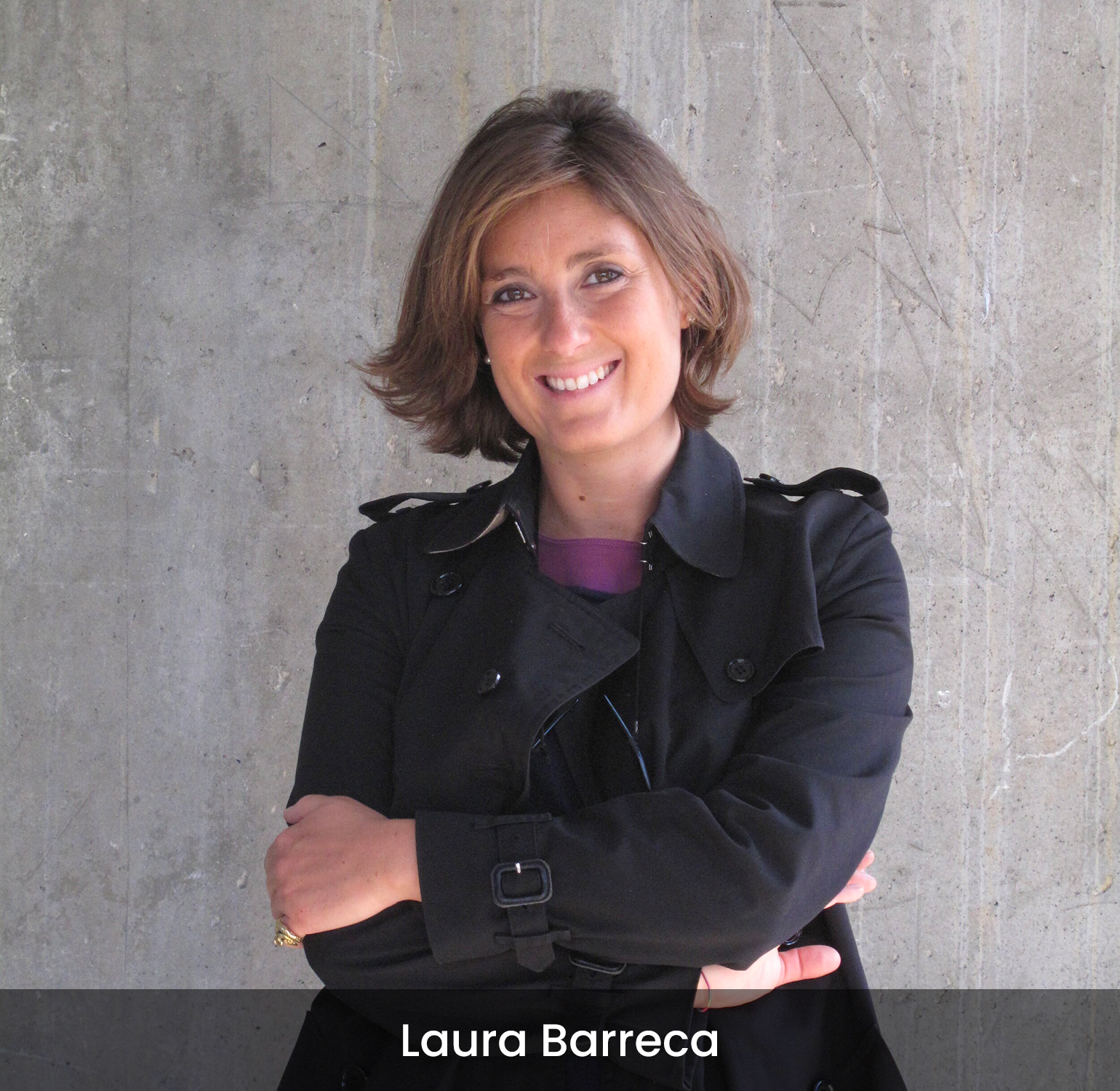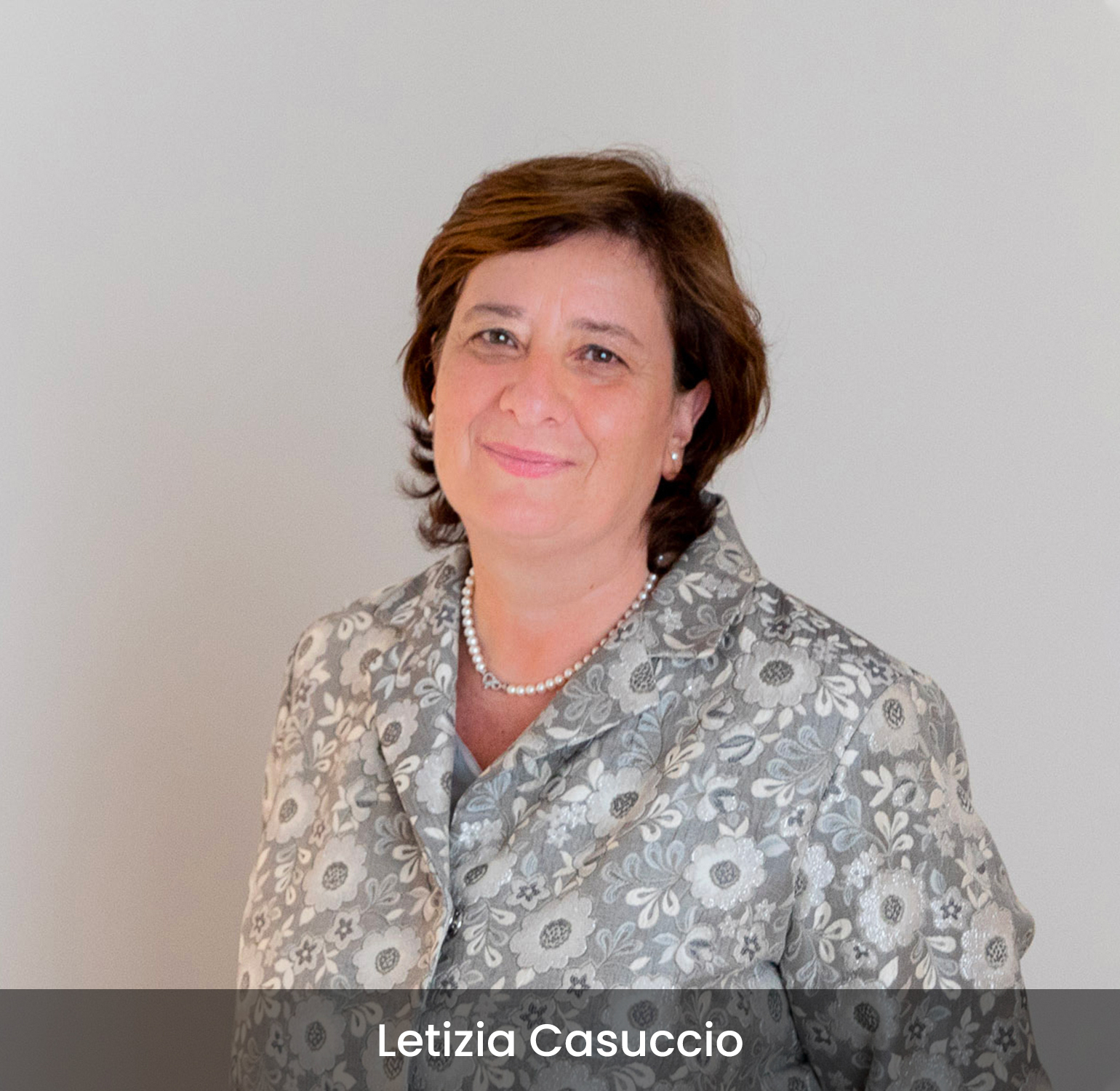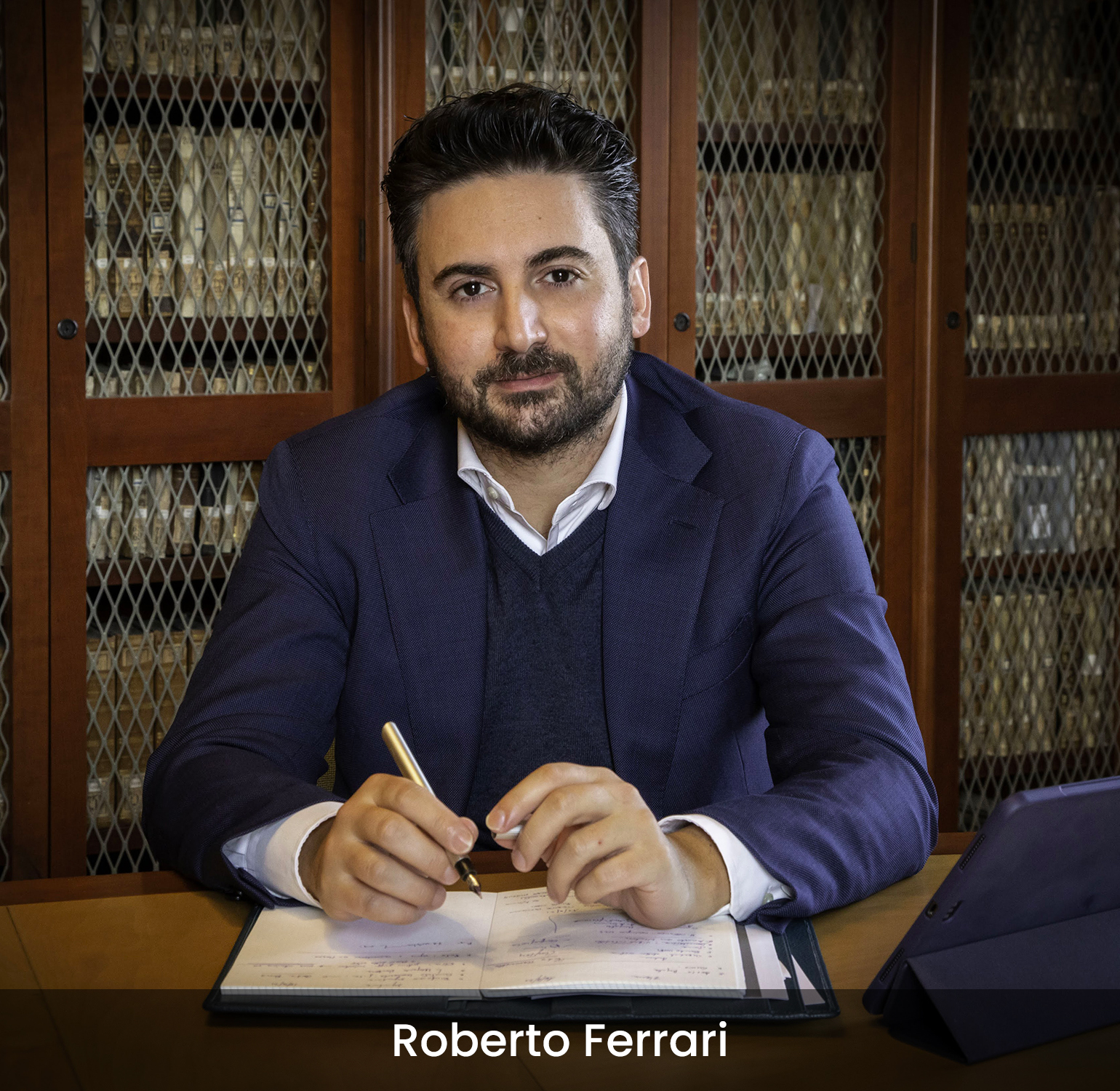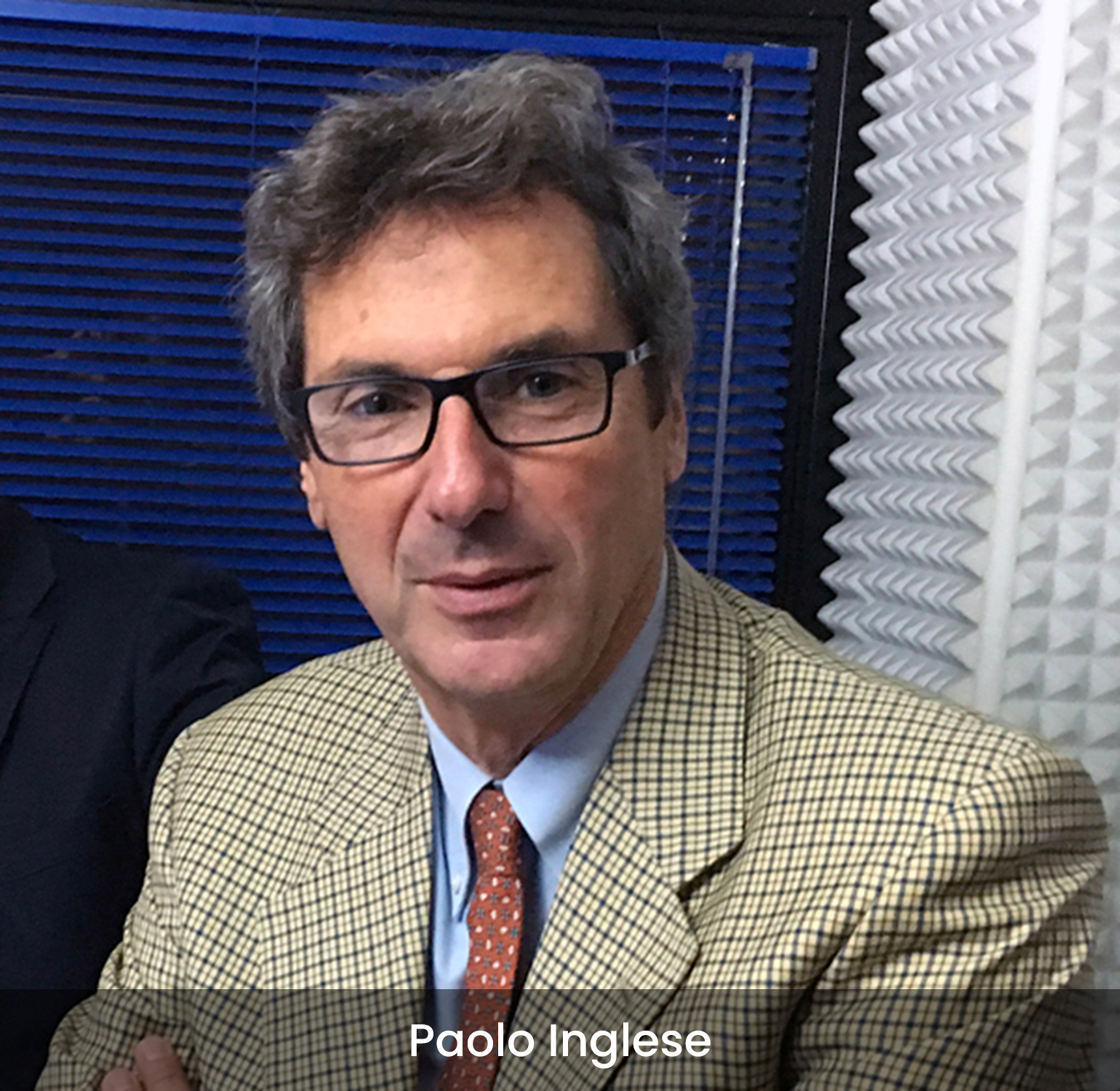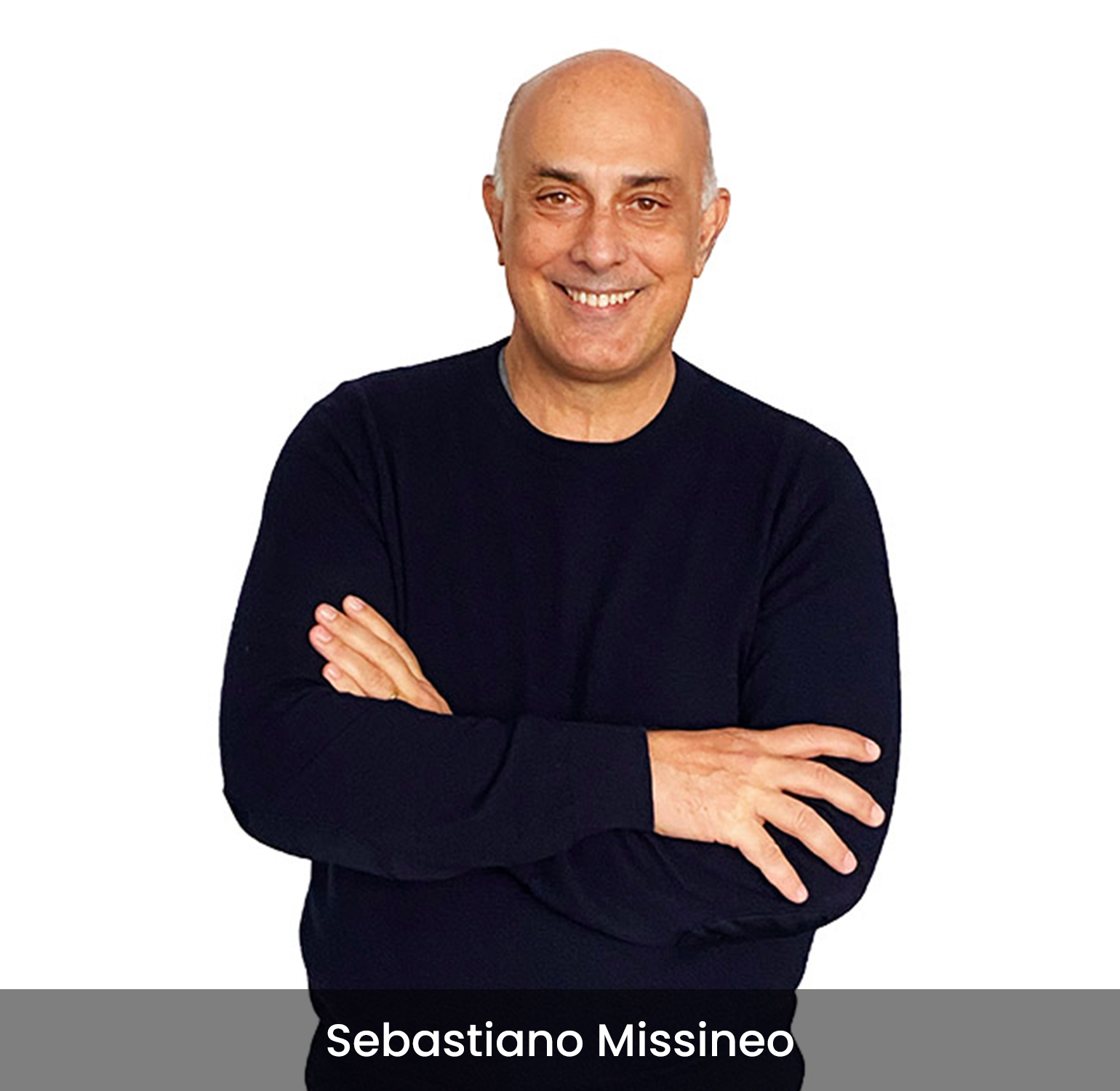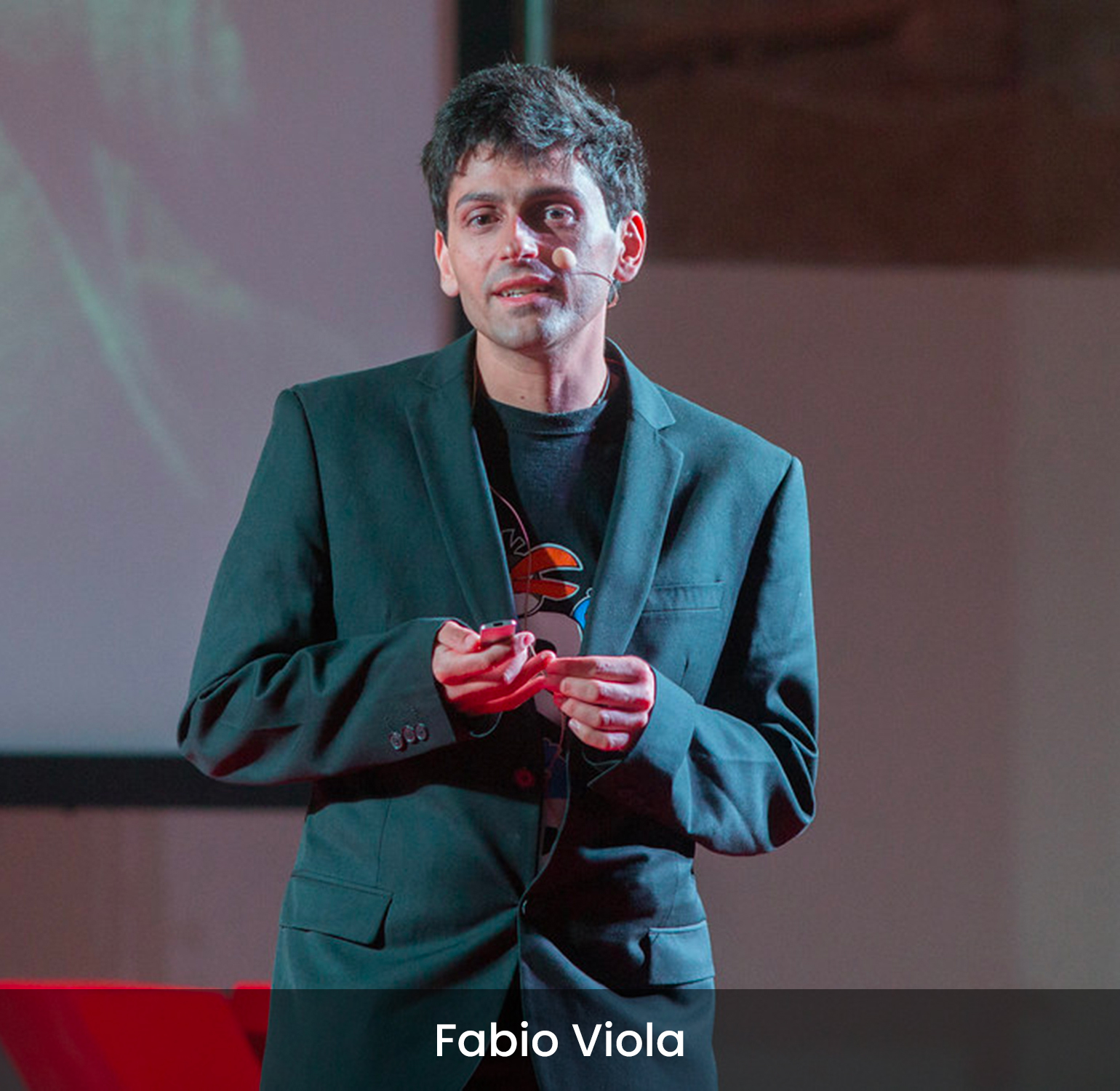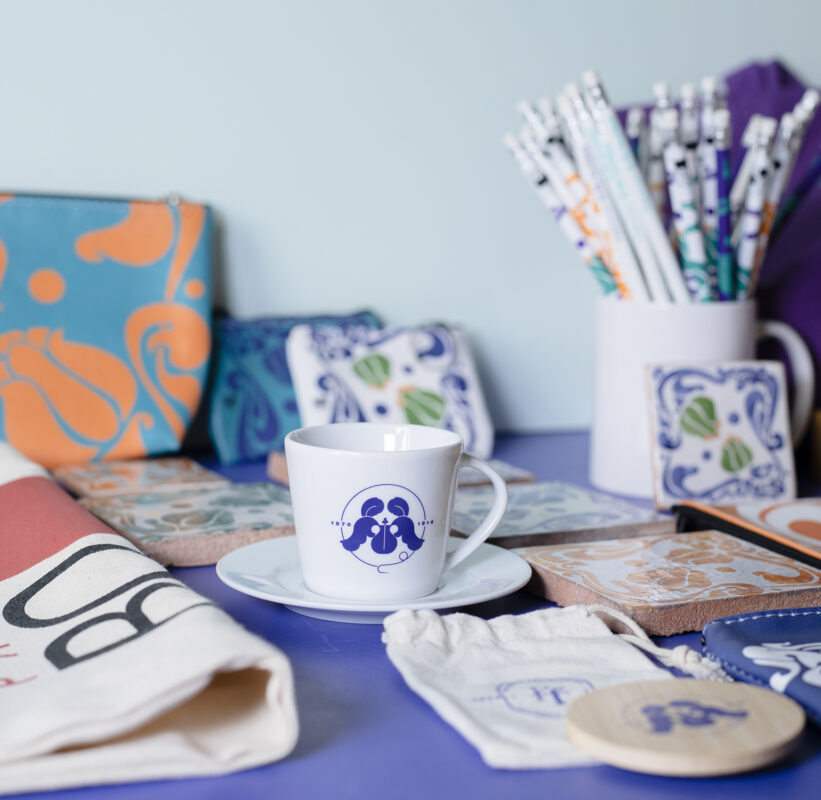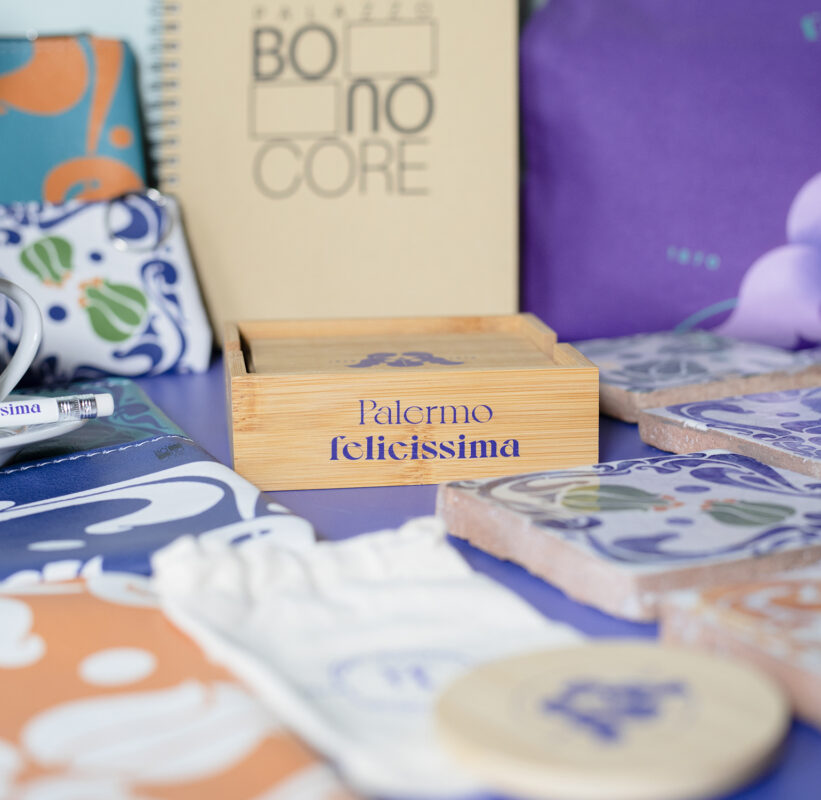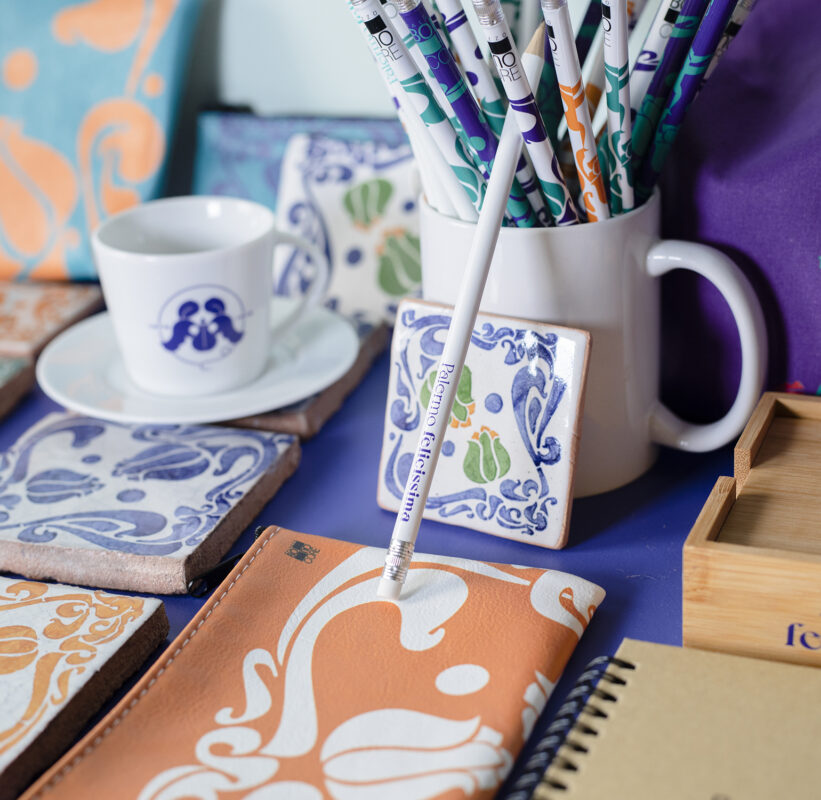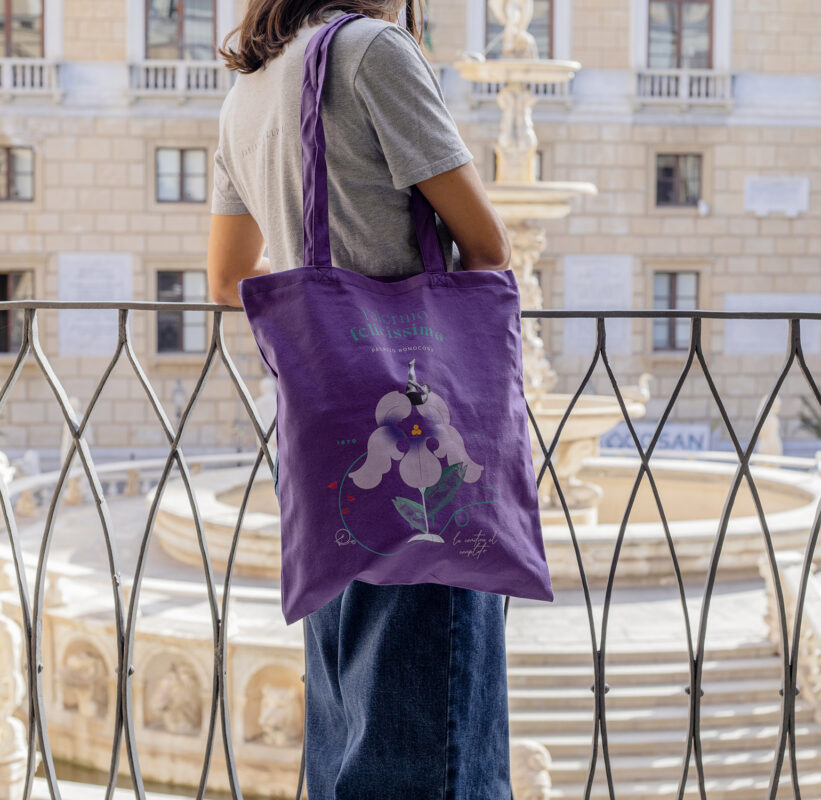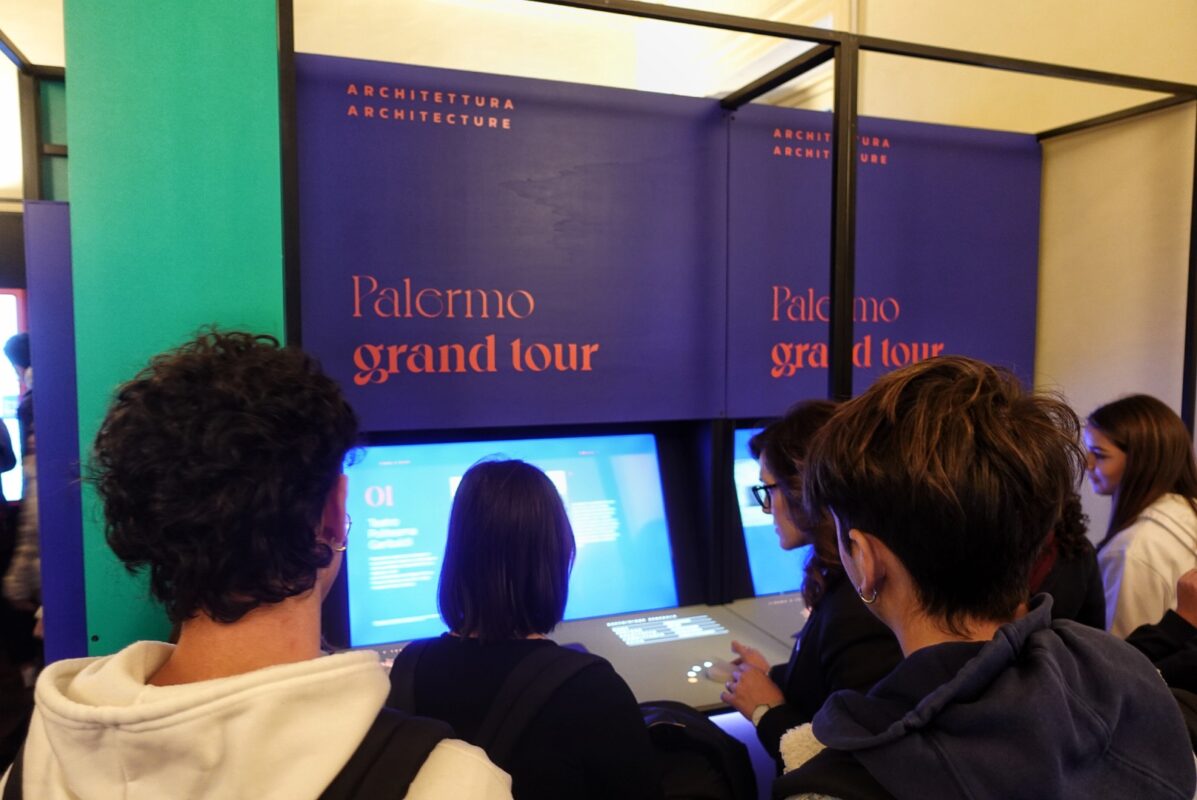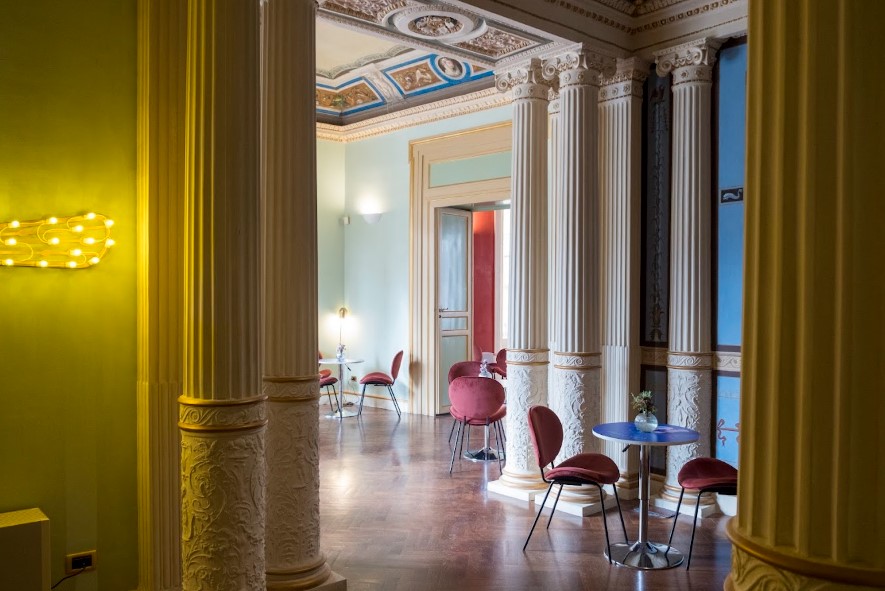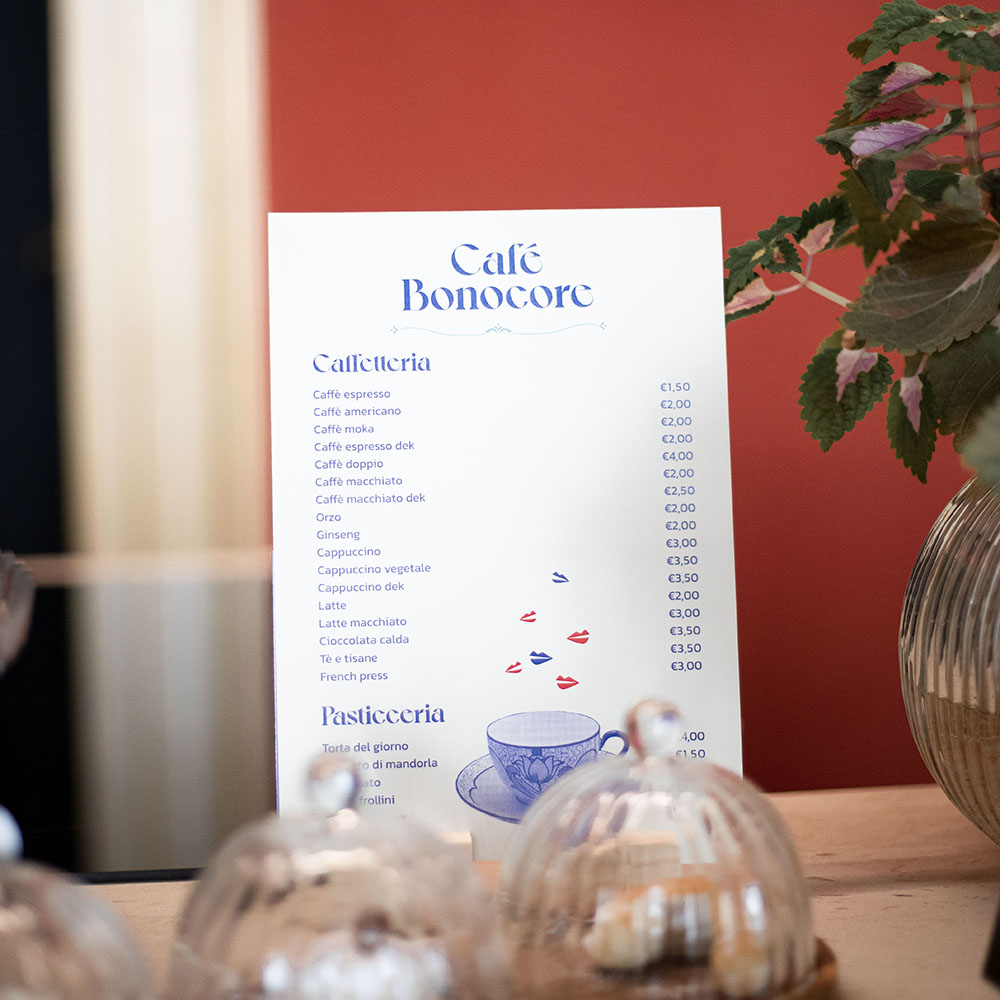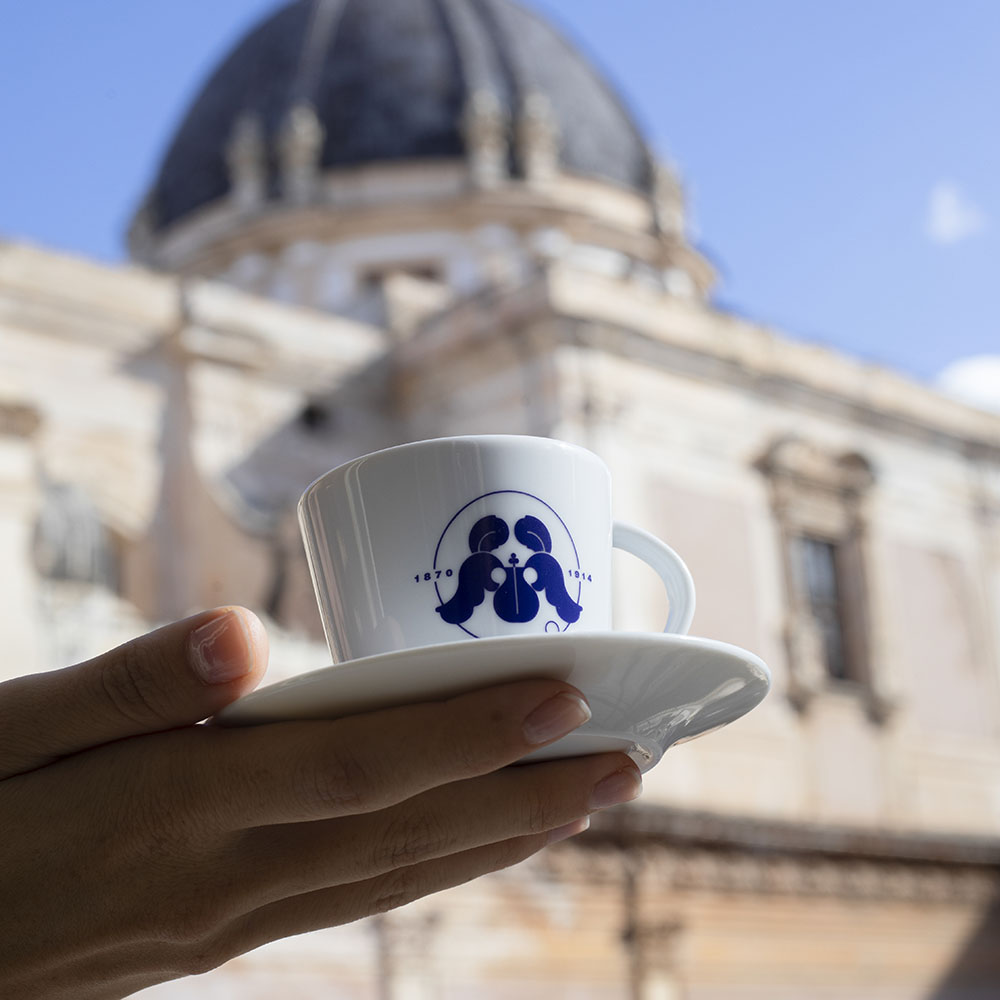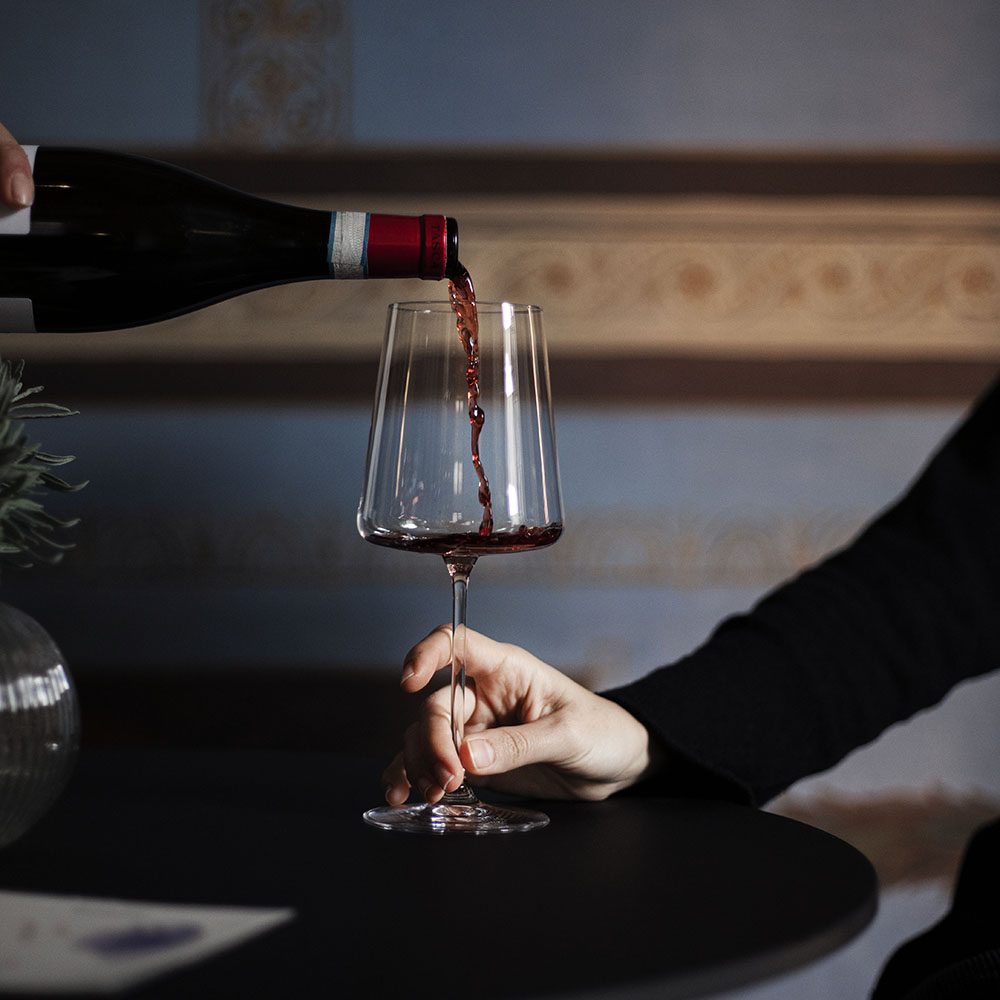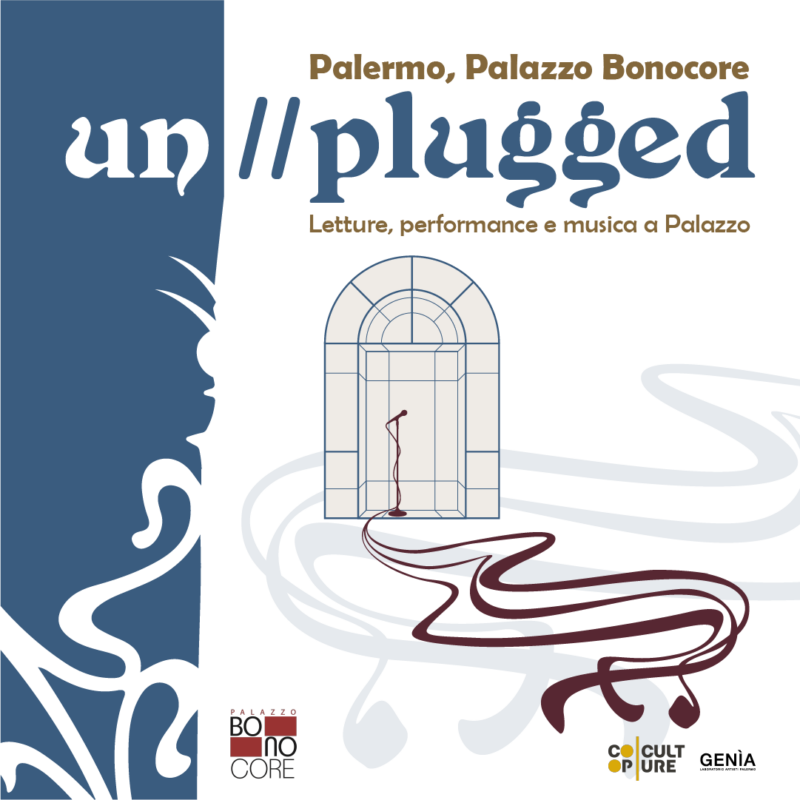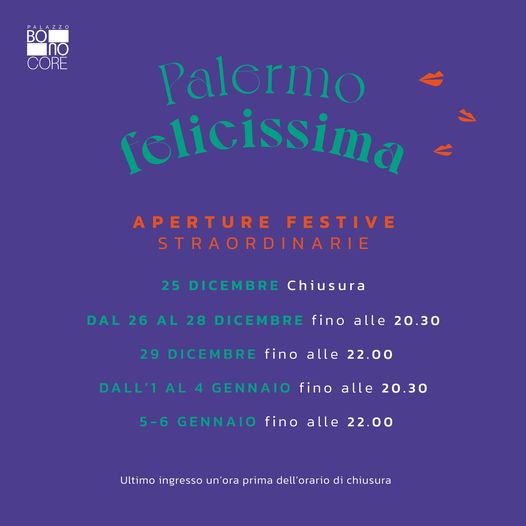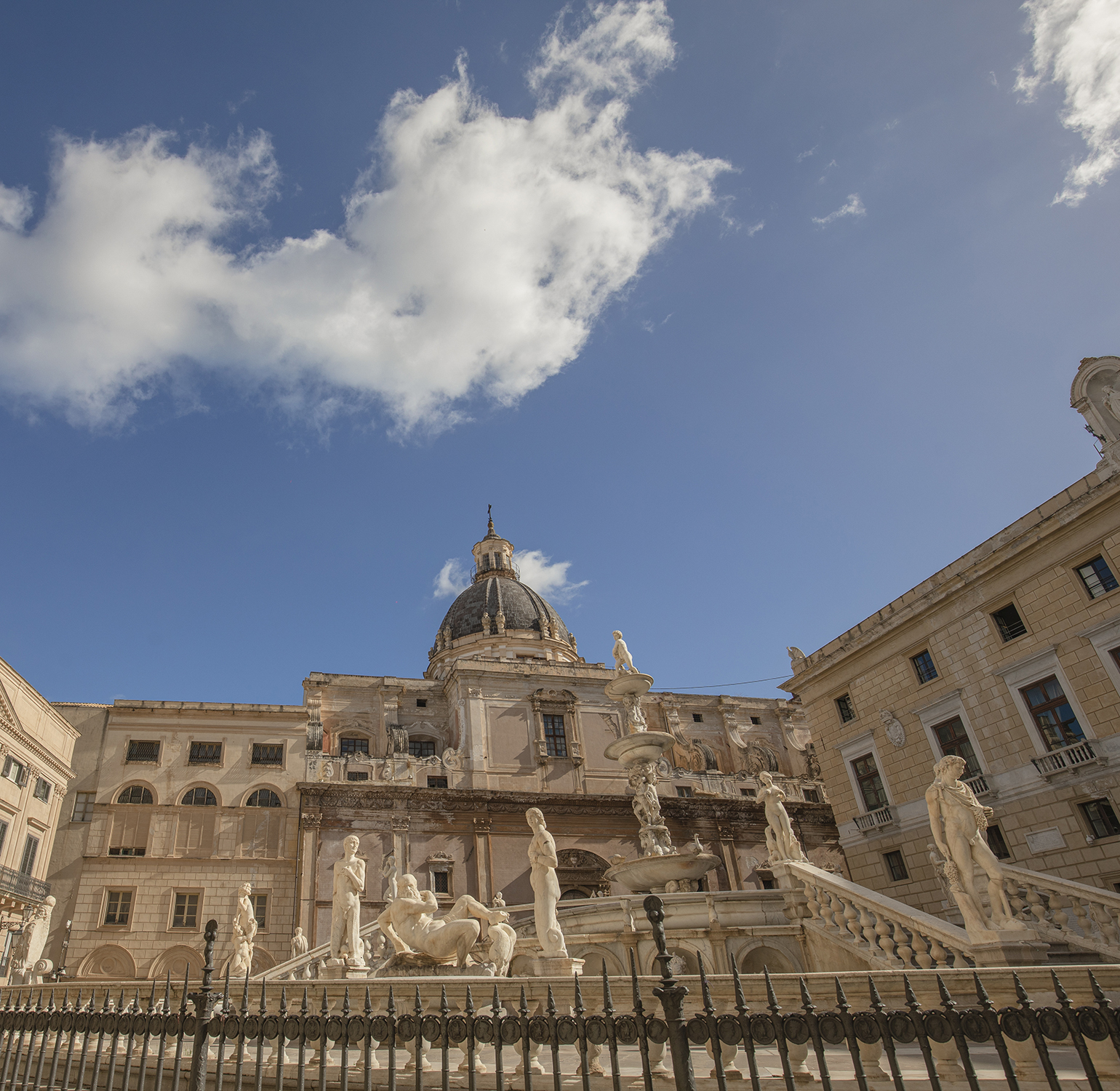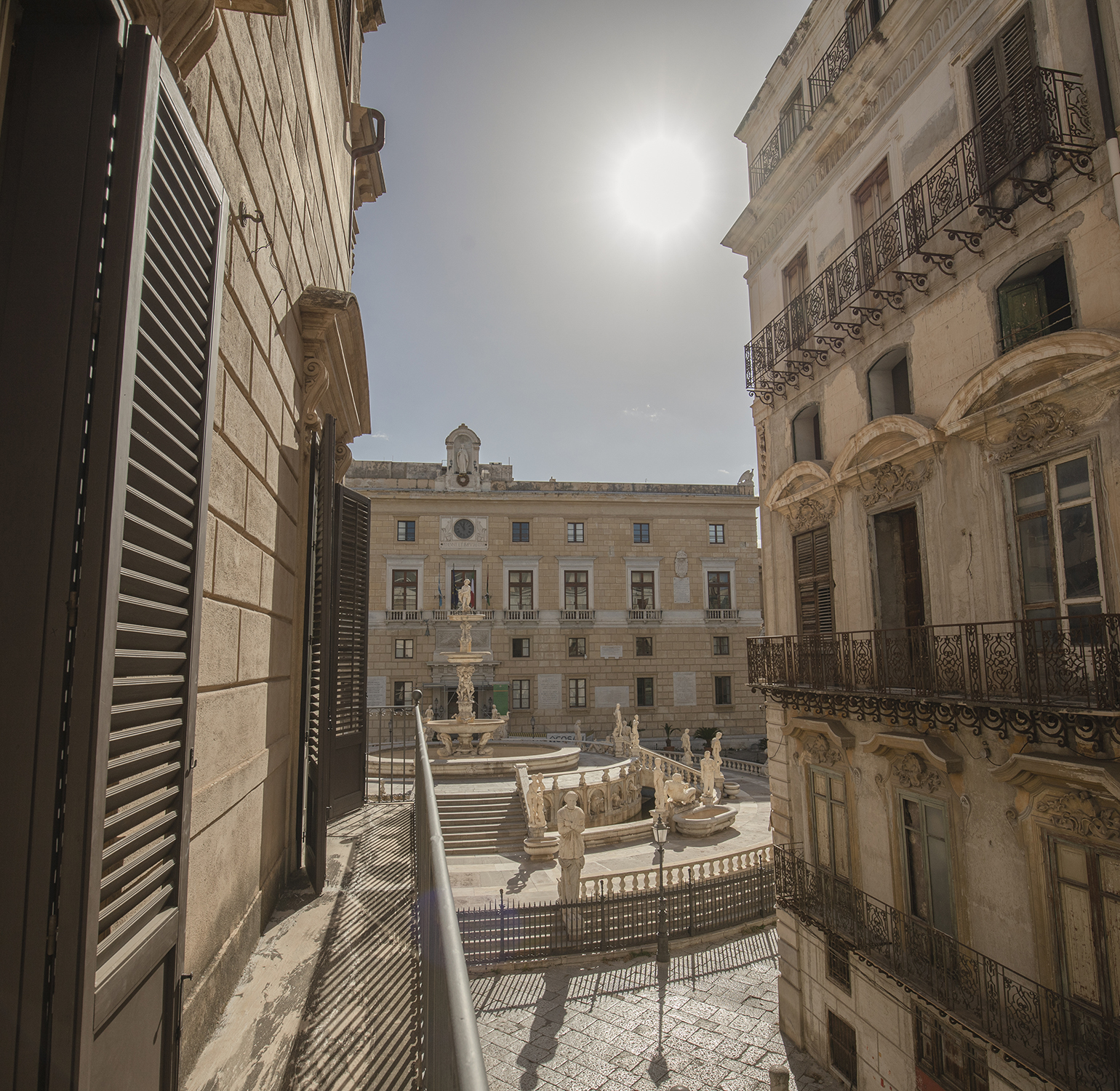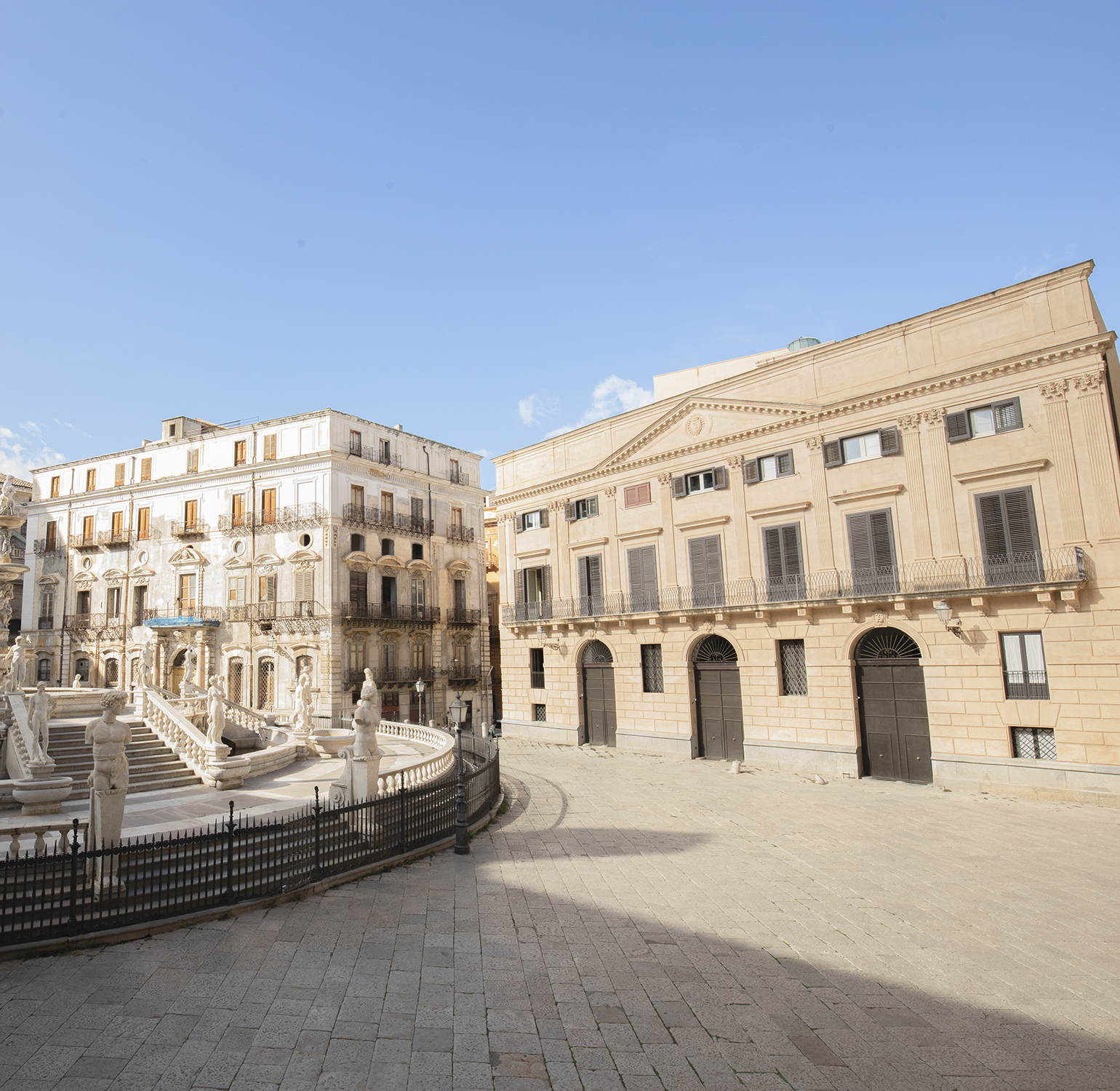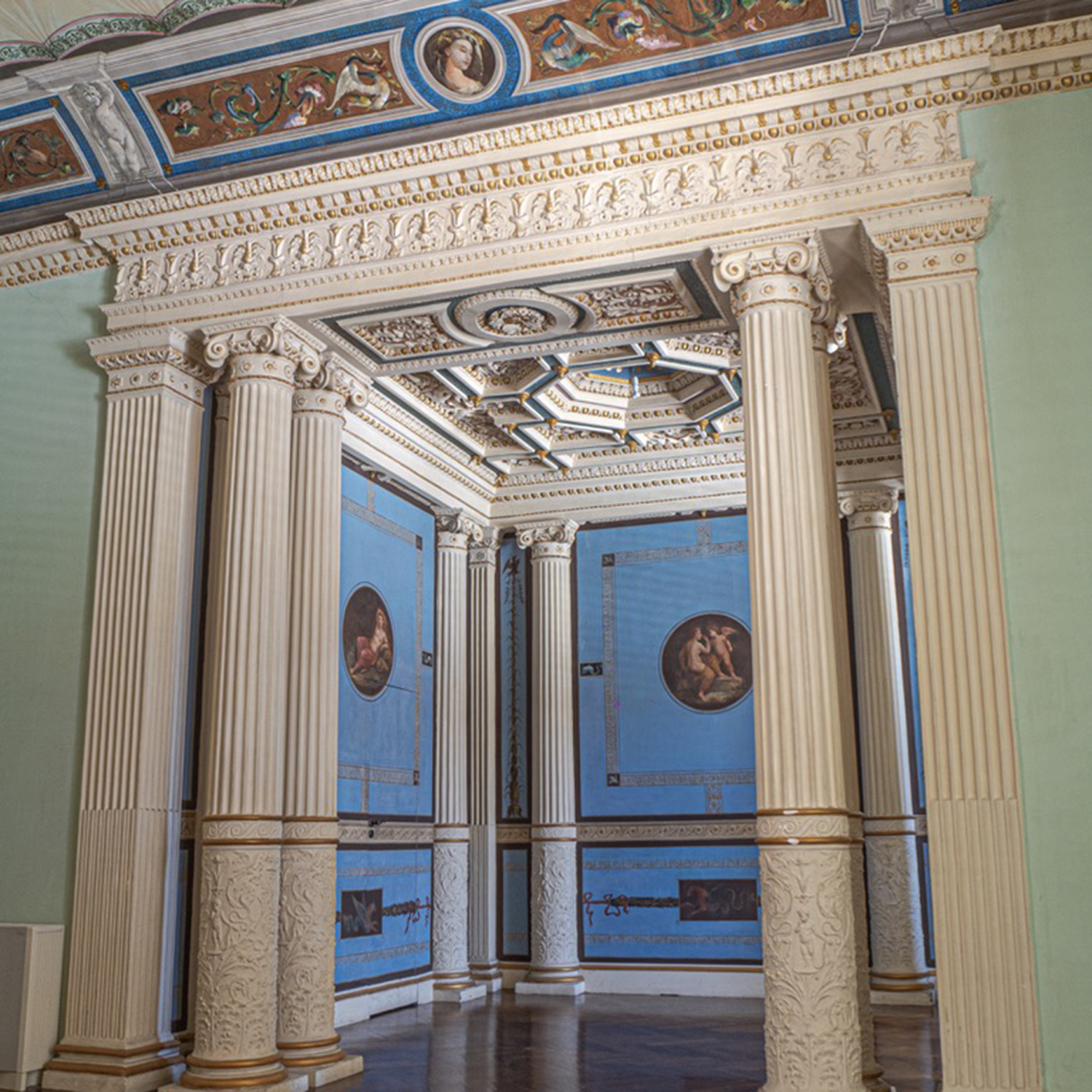Welcome to Palazzo Bonocore
Space of production
Innovation lab
Place of experience
Immersive and engaging exhibition space
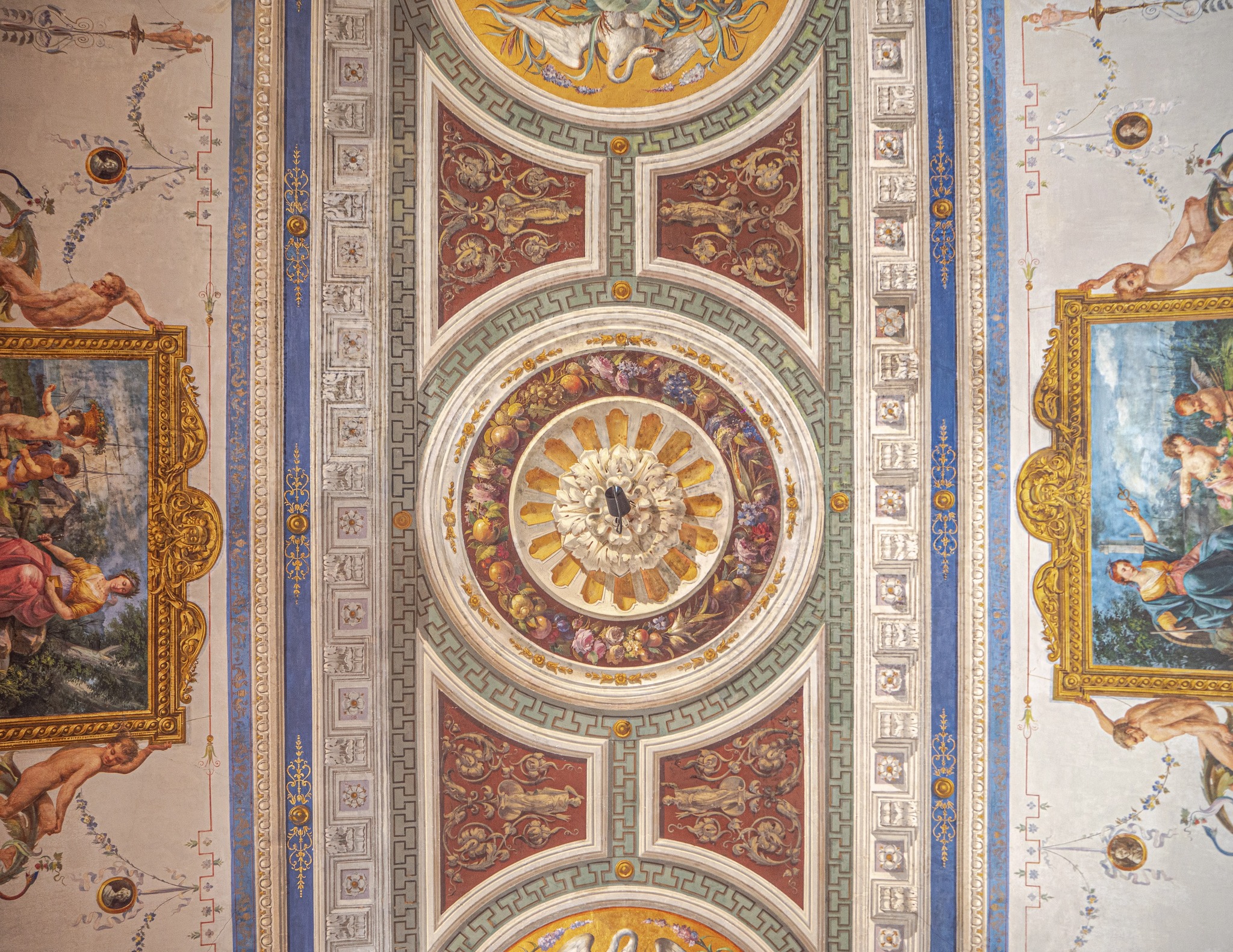
The Palazzo
Built in the late sixteenth century a few steps from the Quattro Canti, Palazzo Bonocore is located in the heart of the historic centre of the city of Palermo, bordering the ancient Arab neighbourhood of Kalsa.
It is one of the buildings that frame Piazza Pretoria, along with Palazzo Pretorio, the baroque church of Santa Caterina d'Alessandria and the noble Palazzo Bordonaro. Its balconies overlook the monumental Pretoria fountain, known as the "Fountain of Shame".
Over the centuries, the various owners of the Mansion have made numerous changes and stylistic transformations which are fully demonstrated by the structure of the building. The current appearance, in neoclassical style, is owed to the Duke of Serradifalco. In 1873 it was purchased by the wealthy banker Salvatore Bonocore, from whom it takes its name.
Recently restored by the Superintendency of Cultural Heritage of Palermo, Palazzo Bonocore consists of a large ground floor, originally dedicated to the stables, embellished by a red marble staircase, decorated on its sides with small bronze lion heads, which leads to the main floor. The latter boasts splendid halls entirely decorated with paintings from the second half of the nineteenth century, which offer a vast figurative repertoire, including grotesques, bucolic scenes, classical divinities, festive cherubs, zoomorphic elements, allegories of the four seasons and scenes linked to harvesting and picking grapes.
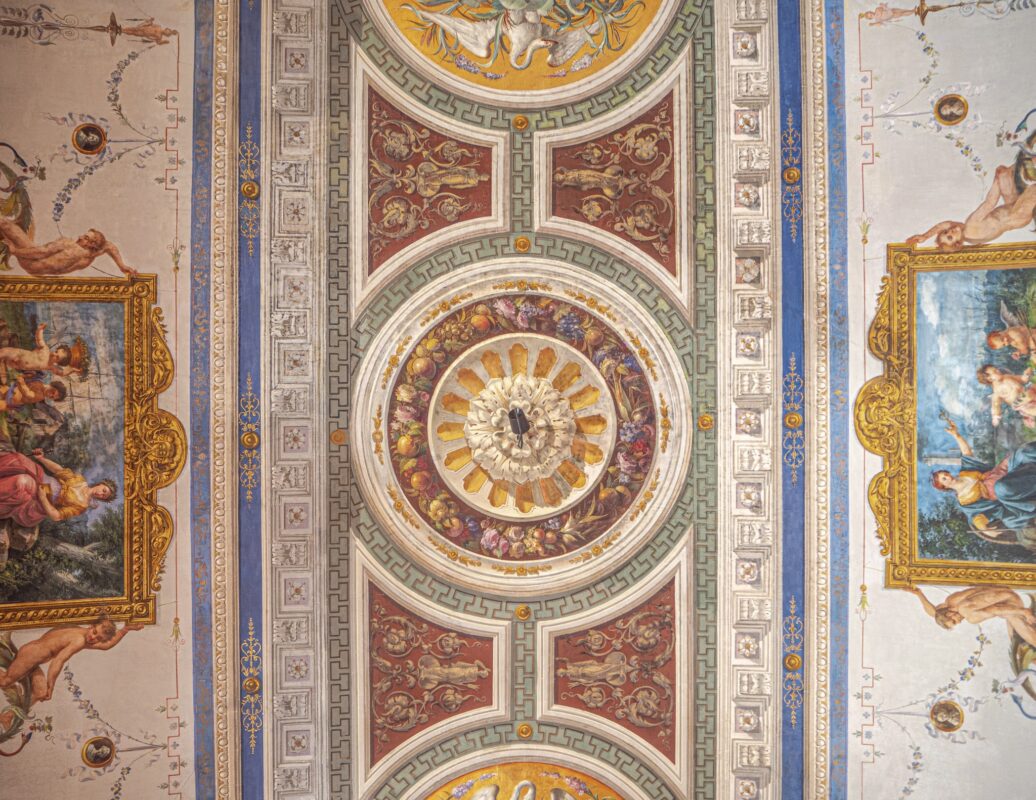
Built in the late sixteenth century a few steps from the Quattro Canti, Palazzo Bonocore is located in the heart of the historic centre of the city of Palermo, bordering the ancient Arab neighbourhood of Kalsa.
It is one of the buildings that frame Piazza Pretoria, along with Palazzo Pretorio, the baroque church of Santa Caterina d’Alessandria and the noble Palazzo Bordonaro. Its balconies overlook the monumental Pretoria fountain, known as the “Fountain of Shame”.
Over the centuries, the various owners of the Mansion have made numerous changes and stylistic transformations which are fully demonstrated by the structure of the building. The current appearance, in neoclassical style, is owed to the Duke of Serradifalco. In 1873 it was purchased by the wealthy banker Salvatore Bonocore, from whom it takes its name.
Recently restored by the Superintendency of Cultural Heritage of Palermo, Palazzo Bonocore consists of a large ground floor, originally dedicated to the stables, embellished by a red marble staircase, decorated on its sides with small bronze lion heads, which leads to the main floor. The latter boasts splendid halls entirely decorated with paintings from the second half of the nineteenth century, which offer a vast figurative repertoire, including grotesques, bucolic scenes, classical divinities, festive cherubs, zoomorphic elements, allegories of the four seasons and scenes linked to harvesting and picking grapes.
The Palazzo
Built in the late sixteenth century a few steps from the Quattro Canti, Palazzo Bonocore is located in the heart of the historic centre of the city of Palermo, bordering the ancient Arab neighbourhood of Kalsa.
It is one of the buildings that frame Piazza Pretoria, along with Palazzo Pretorio, the baroque church of Santa Caterina d’Alessandria and the noble Palazzo Bordonaro. Its balconies overlook the monumental Pretoria fountain, known as the “Fountain of Shame”.
Over the centuries, the various owners of the Mansion have made numerous changes and stylistic transformations which are fully demonstrated by the structure of the building. The current appearance, in neoclassical style, is owed to the Duke of Serradifalco. In 1873 it was purchased by the wealthy banker Salvatore Bonocore, from whom it takes its name.
Recently restored by the Superintendency of Cultural Heritage of Palermo, Palazzo Bonocore consists of a large ground floor, originally dedicated to the stables, embellished by a red marble staircase, decorated on its sides with small bronze lion heads, which leads to the main floor. The latter boasts splendid halls entirely decorated with paintings from the second half of the nineteenth century, which offer a vast figurative repertoire, including grotesques, bucolic scenes, classical divinities, festive cherubs, zoomorphic elements, allegories of the four seasons and scenes linked to harvesting and picking grapes.
The Palazzo
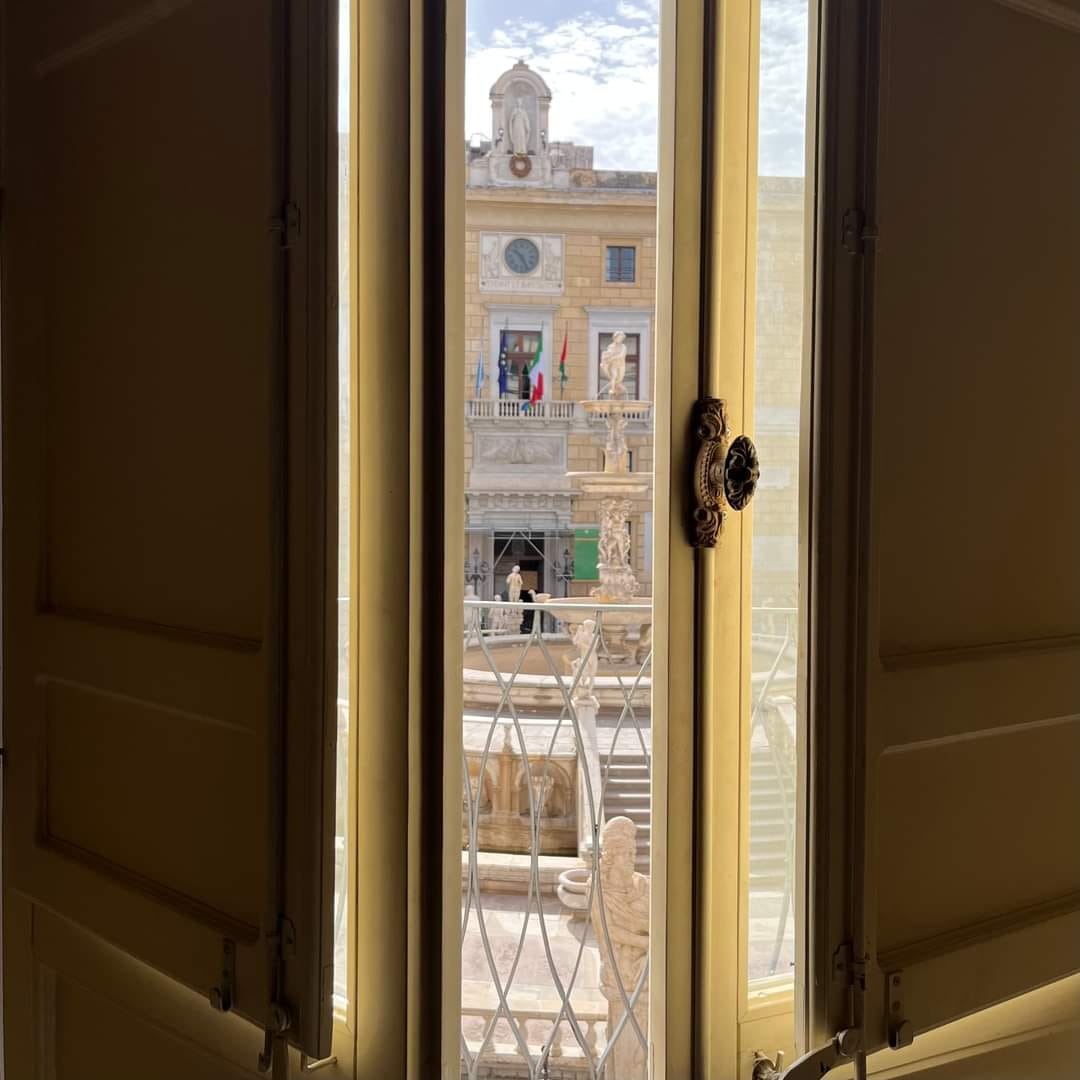
The Project
The palace has been assigned by the Diocese of Palermo to CoopCulture through public evidence.
CoopCulture turns this space into a dynamic and accessible cultural pole, 'a compass' in the heart of the city
Anyone who is about to experience Palermo with new eyes will be able to find original traces in Palazzo Bonocore, an agile system of coordinates for discovering new paths that will cross the history of the city, the distinctive features of its identity, the well-known and also unexpected links that have intertwined the destiny of a "very happy" city with the Mediterranean basin and the development of European civilization.
The magnetic North Pole of this new "compass" will be the multifaceted history of the stories of its communities, every day collecting the hopes, fears, and ideas of those who want to tell their stories and perhaps be reflected a little in the story of Palermo and its people.
New themes will give rise to interviews, documentaries and debates, starting with the people of Palermo, to converge - under the guidance of a Scientific Committee of experts - towards a cultural program (exhibitions, interactive exhibits, events, itineraries in the city) that is open to everyone, in collaboration with institutions, organizations and people who want to offer the city and those who visit it an original cultural map (of art, architecture, science, nature, community) that is different every day, an in which the people of Palermo are not only inhabitants but co-authors.
Palazzo Bonocore is thus a candidate to be a local cultural hub available to everyone.
For residents, it's a civic and community meeting space that fosters a sense of belonging and local pride.
For young people, it's a catalyst for individual creativity and inspiration.
For cultural workers, it's a workshop for artistic production.
For groups and associations, it's an inclusive and intercultural home for social regeneration.
For local producers, it's a showcase of excellence and authenticity.
For the world of research, it's a living laboratory for innovation.
For everyone, it is a place of experiences, exchange, learning and entertainment.
The Scientific Committee
The project prides itself on the collaboration of a committee of experts, carefully selected for their vast knowledge and expertise in the fields of the arts, history and culture, which plays a crucial role in defining the artistic and cultural direction of the institution.
Laura Barreca. (PhD) is an art historian and teaches Art History at the Academy of Fine Arts in Catania. She has been Scientific Director of the mudaC |museo delle arti Carrara since 2019 and Director of the Civic Museum of Castelbuono since 2014. She is a member of the Advisory Board of the Fondazione Scuola dei Beni Culturali.
Letizia Casuccio. General Director of CoopCulture, she is currently a member of the national management of the League of Cooperatives and of the presidency of LegaCoop Lazio. President of the DMO Etruskey and of the DMO ES.CO, Esquilino Community. She is also a member of the Unicredit Centro Advisory Board.
Roberto Ferrari. Executive director of the Galileo Museum – Institute and Museum of the History of Science in Florence. Formerly the director of the 'Culture and Research' Directorate of the Tuscany Region, today he is an independent member of the Board of Directors of the University of Florence, the Board of Directors of the National Galleries of Ancient Art of Rome and the Board of Directors of the Science and Technology Foundation of Florence.
Paolo Inglese. Full professor of General Arboriculture and Arboreal Crops at the University of Palermo, where he was Vice-Rector from 2019 to 2021. He chaired and coordinated the “Agricultural Science and Technology” and “Food Science and Technology” courses at the University of Palermo.
Sebastiano Missineo. Contract professor of Business Models for the enhancement of internal areas at the Faculty of Tourism Sciences of the European University of Rome, he is CEO of Strateghia srl, a strategic training and consultancy company in tourism and cultural marketing.
Fabio Viola. Among the leading game designers in the world, a pioneer of Gamification Italy, he coordinated the first Italian university courses dedicated to the discipline. An expert in video game tourism, he has directed numerous award-winning projects linked to tourism and cultural enhancement.
The project
The palace has been assigned by the Diocese of Palermo to CoopCulture through public evidence.
CoopCulture turns this space into a dynamic and accessible cultural pole, 'a compass' in the heart of the city
Anyone who is about to experience Palermo with new eyes will be able to find original traces in Palazzo Bonocore, an agile system of coordinates for discovering new paths that will cross the history of the city, the distinctive features of its identity, the well-known and also unexpected links that have intertwined the destiny of a "very happy" city with the Mediterranean basin and the development of European civilization.
The magnetic North Pole of this new "compass" will be the multifaceted history of the stories of its communities, every day collecting the hopes, fears, and ideas of those who want to tell their stories and perhaps be reflected a little in the story of Palermo and its people.
New themes will give rise to interviews, documentaries and debates, starting with the people of Palermo, to converge - under the guidance of a Scientific Committee of experts - towards a cultural program (exhibitions, interactive exhibits, events, itineraries in the city) that is open to everyone, in collaboration with institutions, organizations and people who want to offer the city and those who visit it an original cultural map (of art, architecture, science, nature, community) that is different every day, an in which the people of Palermo are not only inhabitants but co-authors.
Palazzo Bonocore is thus a candidate to be a local cultural hub available to everyone.
For residents, it's a civic and community meeting space that fosters a sense of belonging and local pride.
For young people, it's a catalyst for individual creativity and inspiration.
For cultural workers, it's a workshop for artistic production.
For groups and associations, it's an inclusive and intercultural home for social regeneration.
For local producers, it's a showcase of excellence and authenticity.
For the world of research, it's a living laboratory for innovation.
For everyone, it is a place of experiences, exchange, learning and entertainment.
The Scientific Committee
The project prides itself on the collaboration of a committee of experts, carefully selected for their vast knowledge and expertise in the fields of the arts, history and culture, which plays a crucial role in defining the artistic and cultural direction of the institution.
Laura Barreca. (PhD) is an art historian and teaches Art History at the Academy of Fine Arts in Catania. She has been Scientific Director of the mudaC |museo delle arti Carrara since 2019 and Director of the Civic Museum of Castelbuono since 2014. She is a member of the Advisory Board of the Fondazione Scuola dei Beni Culturali.
Letizia Casuccio. General Director of CoopCulture, she is currently a member of the national management of the League of Cooperatives and of the presidency of LegaCoop Lazio. President of the DMO Etruskey and of the DMO ES.CO, Esquilino Community. She is also a member of the Unicredit Centro Advisory Board.
Roberto Ferrari. Executive director of the Galileo Museum – Institute and Museum of the History of Science in Florence. Formerly the director of the 'Culture and Research' Directorate of the Tuscany Region, today he is an independent member of the Board of Directors of the University of Florence, the Board of Directors of the National Galleries of Ancient Art of Rome and the Board of Directors of the Science and Technology Foundation of Florence.
Paolo Inglese. Full professor of General Arboriculture and Arboreal Crops at the University of Palermo, where he was Vice-Rector from 2019 to 2021. He chaired and coordinated the “Agricultural Science and Technology” and “Food Science and Technology” courses at the University of Palermo.
Sebastiano Missineo. Contract professor of Business Models for the enhancement of internal areas at the Faculty of Tourism Sciences of the European University of Rome, he is CEO of Strateghia srl, a strategic training and consultancy company in tourism and cultural marketing.
Fabio Viola. Among the leading game designers in the world, a pioneer of Gamification Italy, he coordinated the first Italian university courses dedicated to the discipline. An expert in video game tourism, he has directed numerous award-winning projects linked to tourism and cultural enhancement.
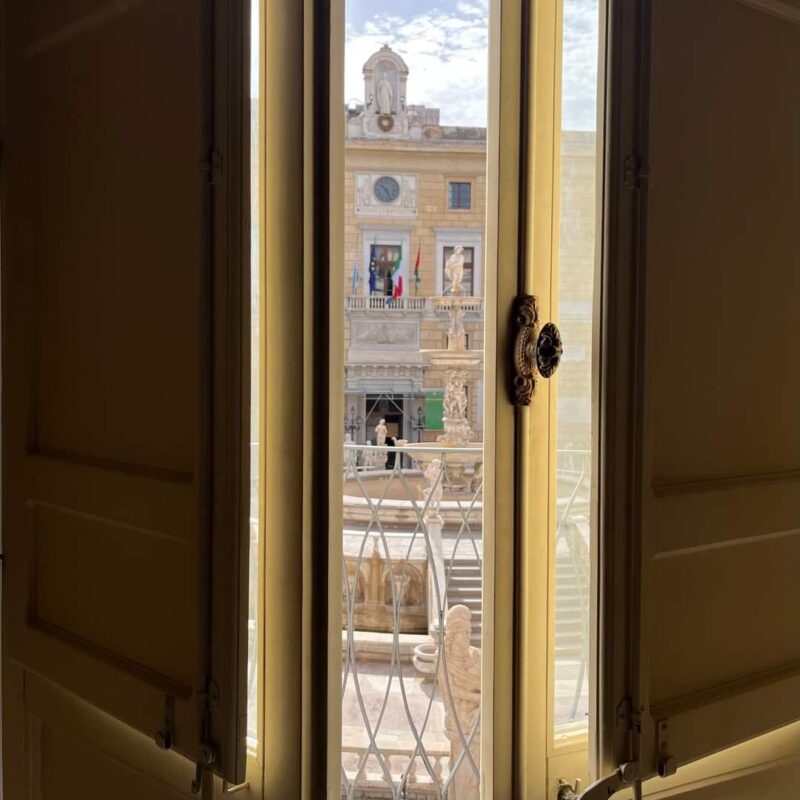
The Project
The palace has been assigned by the Diocese of Palermo to CoopCulture through public evidence.
CoopCulture turns this space into a dynamic and accessible cultural pole, 'a compass' in the heart of the city
Anyone who is about to experience Palermo with new eyes will be able to find original traces in Palazzo Bonocore, an agile system of coordinates for discovering new paths that will cross the history of the city, the distinctive features of its identity, the well-known and also unexpected links that have intertwined the destiny of a "very happy" city with the Mediterranean basin and the development of European civilization.
The magnetic North Pole of this new "compass" will be the multifaceted history of the stories of its communities, every day collecting the hopes, fears, and ideas of those who want to tell their stories and perhaps be reflected a little in the story of Palermo and its people.
New themes will give rise to interviews, documentaries and debates, starting with the people of Palermo, to converge - under the guidance of a Scientific Committee of experts - towards a cultural program (exhibitions, interactive exhibits, events, itineraries in the city) that is open to everyone, in collaboration with institutions, organizations and people who want to offer the city and those who visit it an original cultural map (of art, architecture, science, nature, community) that is different every day, an in which the people of Palermo are not only inhabitants but co-authors.
The project was born from the entrustment of the space by the Diocese of Palermo to CoopCulture.
CoopCulture develops concepts for the enhancement of space: Palazzo Bonocore becomes a "cultural compass" in the heart of the city.
Anyone who is about to experience Palermo with new eyes will be able to find original traces in Palazzo Bonocore, an agile system of coordinates for discovering new paths that will cross the history of the city, the distinctive features of its identity, the well-known and also unexpected links that have intertwined the destiny of a "very happy" city with the Mediterranean basin and the development of European civilization.
The magnetic North Pole of this new "compass" will be the multifaceted history of the stories of its communities, every day collecting the hopes, fears, and ideas of those who want to tell their stories and perhaps be reflected a little in the story of Palermo and its people.
New themes will give rise to interviews, documentaries and debates, starting with the people of Palermo, to converge - under the guidance of a Scientific Committee of experts - towards a cultural program (exhibitions, interactive exhibits, events, itineraries in the city) that is open to everyone, in collaboration with institutions, organizations and people who want to offer the city and those who visit it an original cultural map (of art, architecture, science, nature, community) that is different every day, an in which the people of Palermo are not only inhabitants but co-authors.
The project prides itself on the collaboration of a committee of experts, carefully selected for their vast knowledge and expertise in the fields of the arts, history and culture, which plays a crucial role in defining the artistic and cultural direction of the institution.
Laura Barreca. (PhD) is an art historian and teaches Art History at the Academy of Fine Arts in Catania. She has been Scientific Director of the mudaC |museo delle arti Carrara since 2019 and Director of the Civic Museum of Castelbuono since 2014. She is a member of the Advisory Board of the Fondazione Scuola dei Beni Culturali.
Letizia Casuccio. General Director of CoopCulture, she is currently a member of the national management of the League of Cooperatives and of the presidency of LegaCoop Lazio. President of the DMO Etruskey and of the DMO ES.CO, Esquilino Community. She is also a member of the Unicredit Centro Advisory Board.
Roberto Ferrari. Executive director of the Galileo Museum – Institute and Museum of the History of Science in Florence. Formerly the director of the 'Culture and Research' Directorate of the Tuscany Region, today he is an independent member of the Board of Directors of the University of Florence, the Board of Directors of the National Galleries of Ancient Art of Rome and the Board of Directors of the Science and Technology Foundation of Florence.
Paolo Inglese. Full professor of General Arboriculture and Arboreal Crops at the University of Palermo, where he was Vice-Rector from 2019 to 2021. He chaired and coordinated the “Agricultural Science and Technology” and “Food Science and Technology” courses at the University of Palermo.
Sebastiano Missineo. Contract professor of Business Models for the enhancement of internal areas at the Faculty of Tourism Sciences of the European University of Rome, he is CEO of Strateghia srl, a strategic training and consultancy company in tourism and cultural marketing.
Fabio Viola. Among the leading game designers in the world, a pioneer of Gamification Italy, he coordinated the first Italian university courses dedicated to the discipline. An expert in video game tourism, he has directed numerous award-winning projects linked to tourism and cultural enhancement.
The Scientific Committee
Store Culture
The Palazzo Bonocore Store allows visitors to the mansion to enjoy a break in a welcoming and elegant environment, and to immerse themselves in the history of the city while browsing among art objects, handcrafted products and items specially created by local artisans and artists.
These include precious jewels by Giuliana Di Franco, the hand-painted majolica of Toscher Design, fabrics from Palermo company Bellavia, and ceramics from Monreale by Nicolò Giuliano, but will also feature original collections inspired by the themes of the temporary exhibitions occasionally offered by Palazzo Bonocore.
The visiting experience is also enriched by a wide offering of publications, featuring a vast choice of informative titles and in-depth texts dedicated to Palermo and the famous stories that have contributed to the splendour of the city.
Events at Palazzo
GUIDED TOURS FOR GROUPS AND SCHOOLS TO THE "PALERMO FELICISSIMA" EXHIBITION
by reservation only
Don't miss the opportunity to immerse yourself in the lively and captivating history of Palermo.
Book your guided tour of the exhibition and let yourself be transported on an unforgettable journey to the heart of the Belle Époque.
TASTE BONOCORE
DEGUSTA BONOCORE
from March 2 to March 31, every Saturday and Sunday from 18:30 to 20:30
Features a tasting of Sicilian wines from the Bonocore Cafeteria. The journey starts from the cellars of the Palermo province to the Etna region, with its unique characteristics tied to the volcanic soil, and includes Marsala tastings, in harmony with our "Palermo Felicissima" exhibition.
INFO
- Free access to the Cafeteria from 18:30 to 20:30. Closes at 21:00.
- Tasting is paid.
- Paid entry to the "Palermo Felicissima" exhibition (optional).
CafèBonocore
The Cafè Bonocore, nestled within two of the most representative salons of Bonocore Palace, is designed to offer visitors the chance to experience the charm of an ancient and lost city nobility. It aims to retain its uniqueness as a place for cultural exchange, open to the public and a hub for initiatives.
- MENU
The Cafeteria offers a diverse selection of products from the deeply-rooted and rediscovered Palermo confectionery tradition and a wine cellar filled with selections from the Island's extensive viticultural options. - INFO
The Cafeteria is open during the exhibition's opening hours.
On Saturday and Sunday, it is possible to stay in the Cafeteria until 9:00 PM.
Access is included in the exhibition entry ticket.
The Cafè Bonocore, nestled within two of the most representative salons of Bonocore Palace, is designed to offer visitors the chance to experience the charm of an ancient and lost city nobility. It aims to retain its uniqueness as a place for cultural exchange, open to the public and a hub for initiatives.
- MENU
The Cafeteria offers a diverse selection of products from the deeply-rooted and rediscovered Palermo confectionery tradition and a wine cellar filled with selections from the Island's extensive viticultural options. - INFO
The Cafeteria is open during the exhibition's opening hours.
On Saturday and Sunday, it is possible to stay in the Cafeteria until 9:00 PM.
Access is included in the exhibition entry ticket.
Store Culture
The Palazzo Bonocore Store allows visitors to the mansion to enjoy a break in a welcoming and elegant environment, and to immerse themselves in the history of the city while browsing among art objects, handcrafted products and items specially created by local artisans and artists.
These include precious jewels by Giuliana Di Franco, the hand-painted majolica of Toscher Design, fabrics from Palermo company Bellavia, and ceramics from Monreale by Nicolò Giuliano, but will also feature original collections inspired by the themes of the temporary exhibitions occasionally offered by Palazzo Bonocore.
The visiting experience is also enriched by a wide offering of publications, featuring a vast choice of informative titles and in-depth texts dedicated to Palermo and the famous stories that have contributed to the splendour of the city.
Eventi al Palazzo
UN//PLUGGED
dal 28 dicembre 2023 al 31 gennaio 2024
Letture, performance e musica a Palazzo.
APERTURE SERALI STRAORDINARIE
15-16-22-23-29 dicembre 2023 | 5 e 6 gennaio 2024
fino alle ore 22.00
Con le luci della sera, i visitatori vivranno un'esperienza fortemente suggestiva grazie ai supporti interattivi e multimediali: tavoli, libri e schermi touch screen daranno vita a immagini, testi e video che narrano la Belle Époque in Sicilia.
Ultimo ingresso ore 21.00.
PALAZZO
BONOCORE
Piazza Pretoria 2, 90134, Palermo
OPENING HOURS
- From September 1 to September 30, 2024
_ Monday, Tuesday, and Thursday from 12:00 PM to 8:00 PM
_ Friday, Saturday, and Sunday from 10:00 AM to 8:00 PM
_ Closed on Wednesday
- From October 1 to October 31, 2024
_ Monday, Tuesday, Thursday, Friday, and Saturday from 10:00 AM to 7:00 PM
_ Sunday from 10:00 AM to 6:00 PM
_ Closed on Wednesday
Last entry is always one hour before closing time.
INFO
+ 39 0917489995
info@palazzobonocore.it
TICKETS
Adults: 10,00 euros
Reduced: 8,00 euros for young people aged 18-25, affiliated organizations, and groups of at least 10 people
School groups: 5,00 euros for children aged 6-17, school groups
Free: for children under 6, people with disabilities, and their caregivers
PALAZZO
BONOCORE
Piazza Pretoria 2, 90134, Palermo
OPENING HOURS
- From September 1 to September 30, 2024
_ Monday, Tuesday, and Thursday from 12:00 PM to 8:00 PM
_ Friday, Saturday, and Sunday from 10:00 AM to 8:00 PM
_ Closed on Wednesday
- From October 1 to October 31, 2024
_ Monday, Tuesday, Thursday, Friday, and Saturday from 10:00 AM to 7:00 PM
_ Sunday from 10:00 AM to 6:00 PM
_ Closed on Wednesday
Last entry is always one hour before closing time.
INFO
+ 39 0917489995
info@palazzobonocore.it
TICKETS
Adults: 10,00 euros
Reduced: 8,00 euros for young people aged 18-25, affiliated organizations, and groups of at least 10 people
School groups: 5,00 euros for children aged 6-17, school groups
Free: for children under 6, people with disabilities, and their caregivers
PALAZZO BONOCORE 2023| TUTTI I DIRITTI RISERVATI
